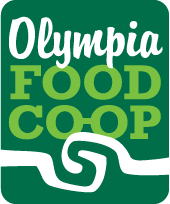Co-op history is rooted in the struggle food justice. In the 1800’s in Europe, as the Industrial Revolution forced families into cities and out of the countryside, people were no longer able to provide for their own food needs and fell victim to unscrupulous retailers. This led to the formation of the first mutual benefit cooperative societies.
The Olympia Food Co-op formed in the early 1970’s along with hundreds of other Food Co-ops and buying clubs throughout the United States. This new wave of co-ops grew largely out of the need for access to healthy, organically grown and minimally processed food. At the same time, farmworker organizing was bringing new light to the plight of workers who provide all of us with our food. Family farms were disappearing. Images of auction hammers selling off farmland to developers linger today. A growing understanding of class and racial oppression began to illustrate problems with food access. For example, as grocery retailers pulled out of poor and racially diverse neighborhoods, they created food deserts: whole communities with access to only convenience stores and fast food. Many of these problems continue today.
Sherry Linkon, in the publication Working Class Perspectives 2011, says that food justice: “aims to ensure that the benefits and risks of producing, distributing, and consuming food are shared fairly by everyone involved, and aims to transform the food system to eliminate inequities.”
A truly just food system would provide for sustainability, fair labor practices, and access to healthful, affordable and culturally appropriate food for all. It would protect the rights of First Nations to continue their traditional practices. It would provide for the welfare of animals in the food system.
Ongoing problems with our food system locally, nationally and internationally include the fact that farmworkers are excluded from the protection of a majority of labor laws, that small, family-scale farmers face incredible barriers in accessing markets, and that food stamp cuts and food deserts combine to reduce access to healthful food for poor people. The list goes on and on.
The Olympia Food Co-op’s mission statement addresses food justice on several levels, beginning with the purpose of providing wholesome foods and other goods and services, accessible to all, and continuing with the goals of providing information about food, making good food accessible to more people, supporting efforts to foster a socially and economically egalitarian society, and supporting local production. These are lofty goals, and no one food co-op can possibly attain them alone.
To further these goals, the Olympia Food Co-op is a member of several organizations working for food justice, as follows
Domestic Fair Trade Association (DFTA)
Founded as a working group in 2005, the DFTA developed 16 Principles of Domestic Fair Trade. This name acknowledges that the food system in the United States and Canada suffers from many of the same exploitive practices found everywhere in the world and would benefit from adopting many of the principles that define the international fair trade movement. As one of the only organizations that bring together stakeholders from all aspects of the food system in a consensus-based group, our decisions include the voices of farmers, farmworkers, retailers, processors and non-profit agencies.
Provender Alliance
The Olympia Food Co-op is a founding member of the Provender Alliance. Provender Alliance exists to educate and inspire our community, providing the tools for education, leadership and community in the natural products trade. Provender formed in 1977, when ‘natural’ and ‘organic’ were emerging concepts. Many Provender members had strong missions values but were not necessarily business savvy. Provender helped members build skills and relationships that have allowed us to build the movement. The annual Provender Conference has sponsored keynotes by Frances Moore Lappe, Winona La Duke, Rosalinda Guillen and David Bronner.
In our own practices we strive to build a just food system in several ways:
1. By prioritizing local, not just in our product selection, but also in the way we work with local farms and food producers, we work to keep local products affordable and to promote the sustainability of local food systems. We also partner with groups like South of the Sound Community Farm Land Trust to preserve farm land here in the South Sound.
2. By prioritizing fair-trade products, such as coffee, chocolate, crafts, bananas, avocados, body care, grains, tomatoes, and more. The variety of fair trade products we sell grows every day.
3. By prioritizing products from co-ops. Organic Valley, Equal Exchange, and Farmer Direct, are examples of the many brands we carry that are cooperatively produced. Worker and farmer owned cooperatives provide access to market for small farmers.
4. By participating in boycotts. Currently farmworkers in Whatcom County (Bellingham area) have formed a union to fight exploitation at Sakuma Brothers Berry Farms. Sakuma Brothers sells to Driscoll Berries, and the workers have called for a boycott of Sakuma and Driscoll Berries. We are honoring this boycott, called by Familias Unidas por la Justicia; Boycott Sakuma Berries. We are also honoring boycotts of products produced in China and Israel, and of Coca-Cola products.
5. By working with co-ops and consumer rights groups to require labeling of genetically modified food products.
Want more information on Food Justice? We recommend the following websites:
Community to Community in Bellingham, Washington
Farmworker Association of Florida
Food Chain Workers Alliance
Just Harvest in Immokalee, Florida
Coalition of Immokalee Workers
United Farm Workers
Fair World Project
La Via Campesina
Agricultural Justice Project
Rural Advancement Fund
